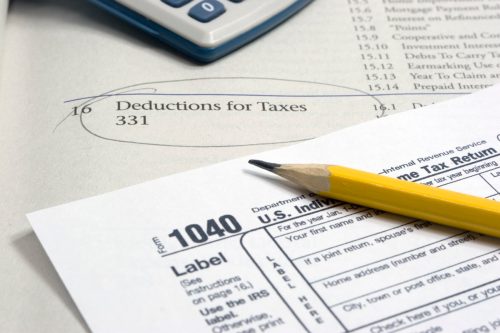The No. 1 Reason You Could Get Audited by the IRS, Experts Warn
You should avoid making this mistake on your tax return.
Trying to file taxes can get confusing quickly due to a complex tax system filled with a seemingly endless number of requirements, exclusions, and exceptions that often change year to year. Taxpayers find the process so complicated that nearly 29 percent shell out hundreds to thousands of dollars every tax season to pay an accountant to file their returns, and around 35 percent use tax preparation software like TurboTax. But no matter how you file, the Internal Revenue Service (IRS) could still come knocking at your door to make sure everything you included on your return was correct. And with the potential for fines and criminal charges, the thought of getting audited by the IRS is enough to scare anyone.
Rest assured the tax agency doesn't have time to conduct such a thorough examination of the millions of returns it receives every year, so it really all comes down to certain red flags. According to tax experts, there is one thing in particular that makes you more likely to be audited by the IRS. Read on to find out what mistake you'll want to avoid when filing taxes this year.
RELATED: The IRS Warns You'll Be Charged More for This Starting April 1.
You could get audited by the IRS for claiming too many deductions.

Deductions are enticing to taxpayers because they can reduce the amount of your income before you calculate the tax you owe, which in turn might significantly lower how much you have to pay in taxes or increase your refund. But that doesn't mean you should go wild writing things off on your tax returns, as experts say claiming too many deductions is the most common reason people end up getting audited by the IRS.
"People sometimes over-claim tax deductions," Samantha Hawrylack, a personal finance expert and co-founder of How To Fire, explains. "If you are not eligible for certain tax benefits, it is important that you don't claim them because they will just lead to an audit."
Don't try writing off deductions that are no longer accepted by the IRS either. The tax code has changed over the years, and there are some things the tax agency no longer recognizes. "You should remember that some of the tax write-offs were terminated by the IRS, including deductions on alimony, moving expenses, and any expenses related to investing, hobbies, and tax preparation," says Dmytro Serheeiv, a professional tax specialist and co-owner of PDFLiner.
RELATED: The IRS Just Warned Taxpayers to Never Take This Deduction.
It's important to pay extra attention to specific deductions.

There are a number of deductions taxpayers can claim on their returns, from work-related and education deductions to itemized and health care deductions. But certain deductions are more likely to sound the alarm than others—even if you don't feel like you've claimed too many. Sarah York, an enrolled agent with the IRS and an in-house tax expert, says that the home office deduction is a "write-off that people tend to abuse," so your return is more likely to get flagged by the IRS if claims in this area seem excessive.
"For example, if you claim your office is 80 percent of your house, that's probably too much," she explains. "Claiming large gifts to charity on your itemized deductions is also likely to result in more scrutiny from the IRS."
Crystal Stranger, the international tax director for GBS and author of The Small Business Tax Guide, says that auto-based deductions are another big area of concern for the IRS. "Claiming large amounts of auto expenses is a big red flag for getting audited especially if there is hardly any income involved," Stranger explains. "Auto expenses are only deductible for amounts used for business, not for commuting or other activities. Claiming 100 percent business deduction for autos is extremely rare."
But you should take all the deductions you're allowed to claim.

The fear of being audited might make you scared of deductions, but not taking any would be a mistake. According to Dana Ronald, a tax expert and the CEO at Tax Crisis Institute, one of the most common reasons people get their tax refunds delayed is failing to claim all of their deductions. The most frequently missed include charitable contributions, medical expenses, job-related expenses, student loan interest, and home office deductions, she says.
"If you have the proper documentation for your deduction, loss or credit, don't be afraid to claim it," the experts at finance site Kiplinger say. "Don't ever feel like you have to pay the IRS more tax than you actually owe."
Hawrylack advises that taxpayers keep track of their deductible expenses throughout the year to ensure they have the records they need once it comes time to file a return. "If you are not sure what deductions are allowed, consult a professional," she recommends.
RELATED: For more financial advice delivered straight to your inbox, sign up for our daily newsletter.
You will receive a notice if you've been selected to be audited by the IRS.

While certain issues like claiming too many deductions can make you more likely to get audited by the IRS, "selection for an audit does not always suggest there's a problem," the tax agency notes. Some people are just randomly selected. If you are being audited by the IRS, the agency says they will notify you by mail. "We won't initiate an audit by telephone," the IRS says.
The tax agency will either conduct your audit by mail or through an in-person interview to review your return and records. "If we conduct your audit by mail, our letter will request additional information about certain items shown on the tax return such as income, expenses, and itemized deductions," the agency says. "If you have too many books or records to mail, you can request a face-to-face audit. The IRS will provide contact information and instructions in the letter you receive."
The IRS will most likely only include returns filed within the last three years in an audit. For substantial errors, they might go back even further, but the IRS says they don't usually go back more than the last six years. And if there are issues with your return, the agency says it prefers to conduct its review sooner rather than later. "The IRS tries to audit tax returns as soon as possible after they are filed. Accordingly most audits will be of returns filed within the last two years," the agency says.
RELATED: The IRS Is Now Warning You to Do This Before Filing Your Taxes.






















